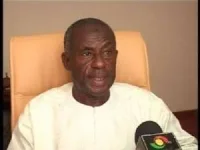Ghana's Attorney General Drops Cases Against Former Officials.
The Ghana Attorney General, Dr. Dominic Ayine, has ended legal action against former Water Minister Alhaji Collins Dauda in the Saglemi Housing case. Dauda and three others faced charges over a $200 million housing project.
The Attorney General's office also stopped the trial of Ernest Thompson, who led the Social Security and National Trust Fund. Thompson had been accused of causing $14.8 million in losses through a business project.
This follows a pattern of the new Attorney General ending cases against former National Democratic Congress officials. These cases mainly involved claims of money losses to the state.
Last Tuesday, an Accra High Court gave the Attorney General three weeks to decide about the Dauda case. Chief State Attorney Hilda Craig had asked the court for time to "put our house in order."
Three days after this request, the office filed papers to end the case. The papers stated that the government would not pursue charges against Dauda, Kweku Agyeman-Mensah, Alhaji Ziblim Yakubu, Andrew Clocanas, and Nouvi Tetteh Angelo.
The law, Section 54 of Act 30, lets the Attorney General stop any criminal case before a final decision. This applies to both main trials and early court steps. The Attorney General can tell the court in person or in writing.
The court will free these people from the charges. But the law allows a future Attorney General to bring new charges if the government changes. Section 54(3) of Act 30 makes this clear - letting the case start again later.
In the Thompson case, the Attorney General dropped charges against three of the four people on trial. Only Caleb Afaglo continues to face charges. Afaglo worked as head of Management Information Systems at SSNIT and faced claims about false school papers.
The office has not said why it kept charges against Afaglo. The choice means Thompson, Peter Hayibor, and John Hagan Mensah will go free. The state had already shown all its proof when this happened.
The Ghana Attorney General, Dr. Dominic Ayine, has ended legal action against former Water Minister Alhaji Collins Dauda in the Saglemi Housing case. Dauda and three others faced charges over a $200 million housing project.
The Attorney General's office also stopped the trial of Ernest Thompson, who led the Social Security and National Trust Fund. Thompson had been accused of causing $14.8 million in losses through a business project.
This follows a pattern of the new Attorney General ending cases against former National Democratic Congress officials. These cases mainly involved claims of money losses to the state.
Last Tuesday, an Accra High Court gave the Attorney General three weeks to decide about the Dauda case. Chief State Attorney Hilda Craig had asked the court for time to "put our house in order."
Three days after this request, the office filed papers to end the case. The papers stated that the government would not pursue charges against Dauda, Kweku Agyeman-Mensah, Alhaji Ziblim Yakubu, Andrew Clocanas, and Nouvi Tetteh Angelo.
The law, Section 54 of Act 30, lets the Attorney General stop any criminal case before a final decision. This applies to both main trials and early court steps. The Attorney General can tell the court in person or in writing.
The court will free these people from the charges. But the law allows a future Attorney General to bring new charges if the government changes. Section 54(3) of Act 30 makes this clear - letting the case start again later.
In the Thompson case, the Attorney General dropped charges against three of the four people on trial. Only Caleb Afaglo continues to face charges. Afaglo worked as head of Management Information Systems at SSNIT and faced claims about false school papers.
The office has not said why it kept charges against Afaglo. The choice means Thompson, Peter Hayibor, and John Hagan Mensah will go free. The state had already shown all its proof when this happened.












